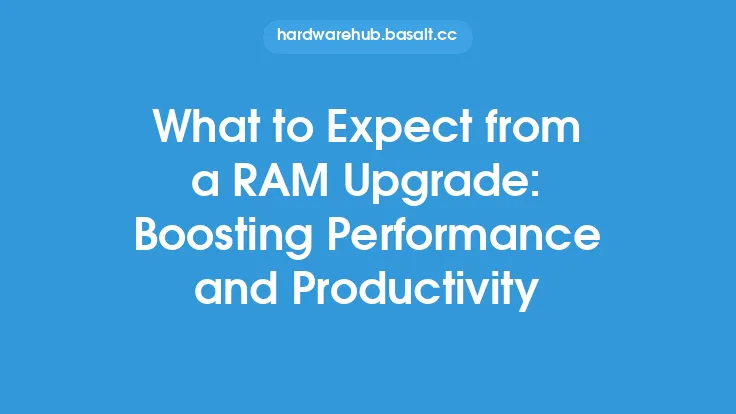When it comes to upgrading a computer, the budget plays a crucial role in determining the outcome. The amount of money allocated for the upgrade can significantly impact the performance, functionality, and overall user experience of the system. In this article, we will delve into the impact of budget on upgrade outcomes, exploring what to expect and how to make the most of your allocated funds.
Understanding the Relationship Between Budget and Upgrade Outcomes
The budget for a computer upgrade can be broken down into several components, including hardware, software, and labor costs. The allocation of funds to each of these components can significantly impact the outcome of the upgrade. For instance, a higher budget can allow for the purchase of more advanced hardware, such as a faster processor, more memory, or a high-performance graphics card. On the other hand, a limited budget may require compromises on the quality or performance of the components.
The Impact of Budget on Hardware Upgrades
Hardware upgrades are a critical aspect of computer upgrades, and the budget can significantly impact the quality and performance of the components. A higher budget can allow for the purchase of more advanced hardware, such as:
- Faster processors: A faster processor can significantly improve the overall performance of the system, allowing for smoother multitasking, faster execution of tasks, and improved responsiveness.
- High-performance graphics cards: A high-performance graphics card can improve the system's ability to handle graphics-intensive tasks, such as gaming, video editing, and 3D modeling.
- More memory: Adding more memory to the system can improve performance, allowing for more applications to be run simultaneously and reducing the need for disk swapping.
- Faster storage: Upgrading to a faster storage solution, such as a solid-state drive (SSD), can significantly improve the system's boot time, loading times, and overall responsiveness.
The Impact of Budget on Software Upgrades
Software upgrades are another critical aspect of computer upgrades, and the budget can impact the quality and functionality of the software. A higher budget can allow for the purchase of more advanced software, such as:
- Operating system upgrades: Upgrading to a newer operating system can provide access to new features, improved security, and better performance.
- Productivity software: Upgrading to more advanced productivity software, such as Microsoft Office or Adobe Creative Cloud, can provide access to new features, improved functionality, and better collaboration tools.
- Security software: Upgrading to more advanced security software, such as antivirus or anti-malware solutions, can provide improved protection against threats and better peace of mind.
The Impact of Budget on Labor Costs
Labor costs are another significant aspect of computer upgrades, and the budget can impact the quality and expertise of the technician performing the upgrade. A higher budget can allow for the hire of a more experienced technician, who can provide:
- Expert installation: A more experienced technician can ensure that the upgrade is installed correctly, reducing the risk of errors or complications.
- Customization: A more experienced technician can provide customization options, such as overclocking or tweaking the system for optimal performance.
- Support: A more experienced technician can provide better support, including troubleshooting and maintenance, to ensure that the system runs smoothly and efficiently.
Making the Most of Your Budget
To make the most of your budget, it's essential to prioritize your needs and allocate your funds accordingly. Here are some tips to help you get the most out of your budget:
- Identify your needs: Determine what you need to upgrade and what your priorities are.
- Research options: Research different components and software to determine which ones will provide the best performance and value for your budget.
- Compare prices: Compare prices from different vendors to ensure that you're getting the best deal.
- Consider refurbished or used components: Refurbished or used components can provide significant savings without compromising on performance.
- DIY upgrades: Consider performing the upgrade yourself, if you have the expertise and experience, to save on labor costs.
Conclusion
In conclusion, the budget plays a critical role in determining the outcome of a computer upgrade. By understanding the relationship between budget and upgrade outcomes, you can make informed decisions about how to allocate your funds to get the most out of your upgrade. Whether you're upgrading hardware, software, or labor costs, it's essential to prioritize your needs and research options to ensure that you're getting the best value for your budget. By following these tips and considering your options carefully, you can create a budget-friendly upgrade plan that meets your needs and provides the best possible outcome.





